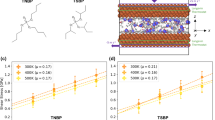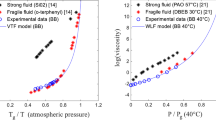Abstract
The tribology of several perfluoropolyether (PFPE) lubricants was studied using a pin on disk (POD) test. During the POD test, PFPE is incrementally removed from the track with each sliding cycle. The number cycles to failure, NF, is detected as a sudden increase in the friction coefficient. Molecular theory for polymer melt rheology was employed to develop a universal scaling rule. The PFPE removal rate coefficient is proportional to a parameter containing the bulk viscosity, degree of polymerization, and temperature and structure scaling coefficients. The parameter is a measure of the frictional resistance to segmental sliding along the surface in the contact zone. The temperature scaling coefficient corrects for the absence of free volume in the molecularly‐thin lubricant film. The structure scaling coefficient accounts for differences in the energy barriers to internal rotation. This is the first description of a relationship for the tribological properties of PFPEs that takes into account their viscosity, molecular structure, degree of polymerization, and temperature.
Similar content being viewed by others
References
B. Bhushan, Tribology and Mechanics of Magnetic Storage Devices (Springer, New York, 1990) p. 629.
J. Liang and L.S. Helmick, Tribol. Trans. 39 (1996) 705.
V.J. Novotny, T.E. Karis and N.W. Johnson, J. Tribol. 114 (1992) 61.
S. Mori and W. Morales, Tribol. Trans. 33 (1990) 325.
T.E. Karis, V.J. Novotny and R.M. Crone, in: Tribology and Mechanics of Magnetic Storage Systems, STLE SP-29 (1990) p. 35.
V.J. Novotny and T.E. Karis, Adv. Info. Storage Syst. 2 (1991) 137.
V.J. Novotny, T.E. Karis and R.J. Whitefield, Tribol. Trans. 40 (1997) 69.
G. Marchionni, G. Ajroldi, P. Cinquina, E. Tampellini and G. Pezzin, Polym. Eng. Sci. 30 (1990) 829.
T.E. Karis and V.J. Novotny, J. Appl. Phys. 66 (1989) 2706.
T.E. Karis, Adv. Info. Storage Syst. 6 (1995) 137.
A.C. Ouano and B. Appelt, Am. Chem. Soc. Org. Coat. Appl. Polym. Sci. Proc. 46 (1981) 230.
C.M. Mate, J. Appl. Phys. 72 (1992) 3084.
P.H. Kasai, Macromolecules 25 (1992) 6791.
T.E. Karis, V.J. Novotny and R.D. Johnson, J. Appl. Polym. Sci. 50 (1993) 1357.
D.J. Ferry, Viscoelastic Properties of Polymers (Wiley, New York, 1980).
T.E. Karis, J. Appl. Polym. Sci. 59 (1996) 1405.
J. Pacansky, M. Miller, W. Hatton, B. Liu and A. Scheiner, J. Am. Chem. Soc. 113 (1991) 329.
Author information
Authors and Affiliations
Rights and permissions
About this article
Cite this article
Karis, T., Jhon, M. The relationship between PFPE molecular rheology and tribology. Tribology Letters 5, 283–286 (1998). https://doi.org/10.1023/A:1019170514590
Issue Date:
DOI: https://doi.org/10.1023/A:1019170514590




